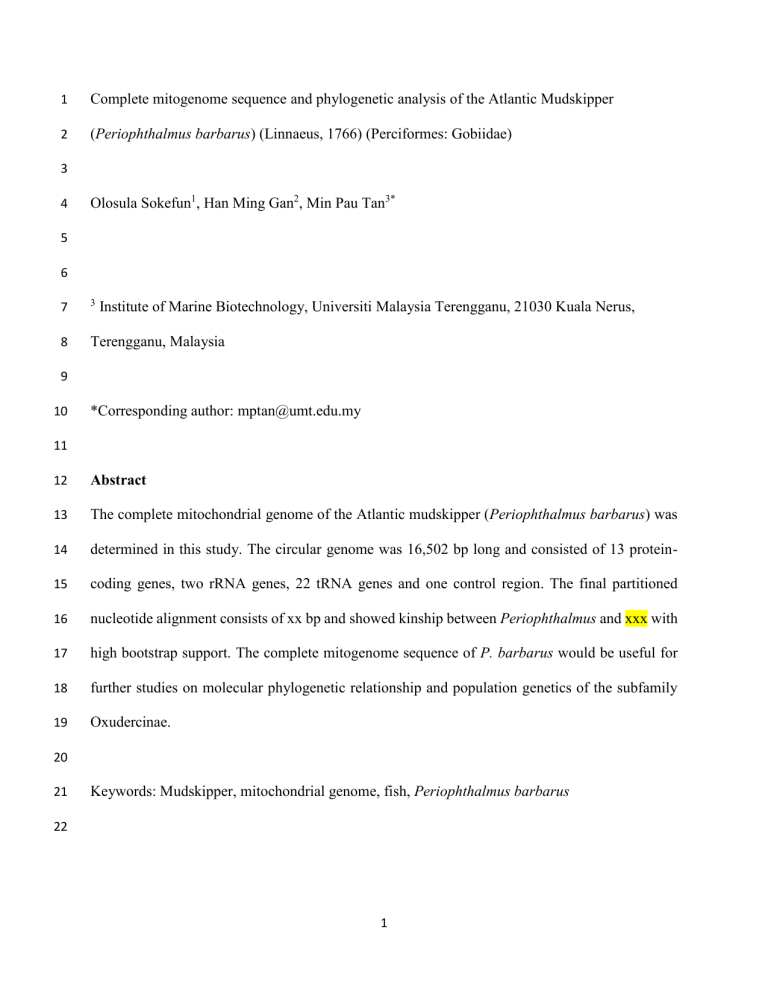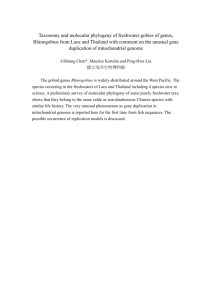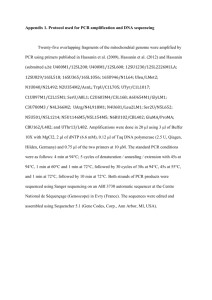
1 Complete mitogenome sequence and phylogenetic analysis of the Atlantic Mudskipper 2 (Periophthalmus barbarus) (Linnaeus, 1766) (Perciformes: Gobiidae) 3 4 Olosula Sokefun1, Han Ming Gan2, Min Pau Tan3* 5 6 7 3 8 Terengganu, Malaysia Institute of Marine Biotechnology, Universiti Malaysia Terengganu, 21030 Kuala Nerus, 9 10 *Corresponding author: mptan@umt.edu.my 11 12 Abstract 13 The complete mitochondrial genome of the Atlantic mudskipper (Periophthalmus barbarus) was 14 determined in this study. The circular genome was 16,502 bp long and consisted of 13 protein- 15 coding genes, two rRNA genes, 22 tRNA genes and one control region. The final partitioned 16 nucleotide alignment consists of xx bp and showed kinship between Periophthalmus and xxx with 17 high bootstrap support. The complete mitogenome sequence of P. barbarus would be useful for 18 further studies on molecular phylogenetic relationship and population genetics of the subfamily 19 Oxudercinae. 20 21 Keywords: Mudskipper, mitochondrial genome, fish, Periophthalmus barbarus 22 1 23 The Atlantic Mudskipper (Periophthalmus barbarus) (Family: Gobiidae, Subfamily: 24 Oxudercinae) is an amphibious and euryhaline fish that occurs along the tropical Atlantic coasts 25 of Africa including most offshore islands. It is small-sized, but important as indicator for 26 environmental pollution especially at the mudflat ecosystem. Recent study aims at exploring its 27 complete mitochondrial genome (the seventh representative from the 19 species of genus 28 Periophthalmus described to date) and the phylogenetic relationship of the mudskippers from 29 subfamily Oxudercinae inferring from the complete mitochondrial genomes. The sample was 30 collected from Port Harcourt, Nigeria (geographical coordinate) and the specimen was deposited 31 at xxx (Olusola Sokefun, osokefun@gmail.com) under voucher specimen xxx. Approximately 50 32 mg of the ethanol-preserved fin sample were treated with 1 uL of RNAse (10 mg/mL) for 30 33 minutes at room temperature followed by purification using bead-bead approach (Oberacker et al. 34 2019). The purified DNA was measured using Denovix high sensitivity kit giving a concentration 35 of 54.2 ng/uL. Approximately 100 ng of DNA was fragmented to 350 bp using a Bioruptor 36 followed by NEB Ultra II library preparation (NEB, Ipswich, MA) according to the manufacturer’s 37 instructions. Sequencing was performed on an Illumina NovaSEQ6000 (Illumina, San Diego, CA) 38 using a run configuration of 2 x 150 bp to generate approximately 1 gb of data. Raw reads were 39 trimmed with fastp v0.21 (Chen et al. 2018) to remove low-quality bases and Illumina adapter 40 sequences. The trimmed reads were subsequently used for de novo assembly in MegaHIT (default 41 setting) (Li et al. 2015). The mitochondrial-derived contig was identified and circularized with 42 MitoZ (Meng et al. 2019). Orientation and annotation of the circular contig was performed with 43 MitoAnnotator (http://mitofish.aori.u-tokyo.ac.jp/annotation/input.html) (Iwasaki et al. 2013). 44 The final partitioned nucleotide alignment consists of 16,502 bp long and supports the 45 monophyly of the genus Periophthalmus. 2 46 47 48 Figure 1 Maximum likelihood inference of the goby phylogeny based on whole mitogenome. The 49 final alignment consists of xx sites. The log-likelihood of consensus tree is -xx. Node values 50 represent ultrafast bootstrap support values based on 1,000 bootstraps. Branch lengths correspond 51 to the mean number of nucleotide substitutions per site. 52 53 Acknowledgements 54 We thank 55 56 Disclosure statement 57 The authors report no conflict of interest and are responsible for the content and writing of the 58 manuscript. 59 60 Data availability statement 61 The data that support the findings of this study are openly available at the US National Center for 62 Biotechnology Information (NCBI database) at https://www.ncbi.nlm.nih.gov/. The GenBank 63 accession number is xxx. 64 65 Funding 66 This work was supported by the xxx. 67 68 References 3 69 70 71 72 Chen, S., Zhou, Y., Chen, Y., Gu, J. 2018. fastp: an ultra-fast all-in-one FASTQ preprocessor. Bioinformatics 34 (17): i884–i890. DOI: 10.1093/bioinformatics/bty560. Felsenstein, J. 1985. Confidence limits on phylogenies: An approach using the bootstrap. Evolution 39: 783–791. 73 Iwasaki, W., Fukunaga, T., Isagozawa, R., Yamada, K., Maeda, Y., Saatoh, T. P., et al. 2013. 74 MitoFish and MitoAnnotator: a mitochondrial genome database of fish with an accurate 75 and automatic annotation pipeline. Molecular Biology and Evolution 30 (11): 2531–2540. 76 DOI: 10.1093/molbev/mst141. 77 Kimura, M. 1980. A simple method for estimating evolutionary rate of base substitutions through 78 comparative studies of nucleotide sequences. Journal of Molecular Evolution 16: 111–120. 79 DOI: 10.1007/BF01731581 80 Li, D., Liu, C-M., Luo, R., Sadakane, K. Lam, T-W. 2015. MEGAHIT: an ultra-fast single-node 81 solution for large and complex metagenomics assembly via succinct de Bruijn graph. 82 Bioinformatics 31(10): 1674–1676. DOI: 10.1093/bioinformatics/btv033. 83 Meng, G., Li, Y., Yang, C., Liu, S. 2019. MitoZ: a toolkit for animal mitochondrial genome 84 assembly, annotation and visualization. Nucleic Acids Research 47(11): e63. DOI: 85 10.1093/nar/gkz173. 86 Oberacker, P., Stepper, P., Bond, D. M., Höhn, S., Focken, J., Meyer, V., et al. 2019. Bio-On- 87 Magnetic-Beads (BOMB): Open platform for high-throughput nucleic acid extraction and 88 manipulation. PLOS Biology 17(1): e3000107. DOI: 10.1371/journal.pbio.3000107. 89 4



